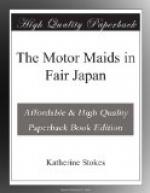In the midst of a great deal of leave-taking and much smiling and bowing, Yoritomo found time to say to Nancy:
“You see, chance has favored me to-day. The rain which kept me away from the bridge has brought you to my home.”
Nancy blushed in spite of her efforts not to. She felt half pleased and half frightened at the earnest manner of the young Japanese. He was undeniably handsome and graceful, with a self-possession she had never seen equaled. Just then a dark figure darted across the floor so swiftly that it was like a flash of brown wings in the air. There was a low exclamation from the ladies, a bird-like chatter from the servants, and for one brief moment the surprised Americans beheld old O’Haru on her knees before little Kenkyo in the act of touching her forehead to the floor. She drew a beautiful, bright-colored toy from her bosom and gave it to the solemn-eyed little boy. Then, bowing again with extreme reverence, she rose and left the house. When they next saw her she was swinging along in the rain on her wooden clogs. Miss Campbell made Komatsu stop the ’riksha and invited her to climb in, but she refused politely but firmly.
“Extraordinary creature,” exclaimed Miss Campbell, but Komatsu could offer no explanation.
CHAPTER IV.
The garden in the rain.
For three interminable days the rain poured down uninterruptedly. The floodgates of heaven had opened and it seemed as though they would never close again. The all-pervading dampness and chill brought illness to the Campbell household of a kind not to be healed by medicine. Homesickness it was, and it spread rapidly like a contagious disease. Only one member of the party of Americans was not afflicted and that was Mr. Campbell, who had lived in many climates and countries and was accustomed to seasons of rain and wet. Moreover, as he himself had said, he had no home to be sick for. He felt a supreme content in the thought of having his daughter with him and no amount of rain could chill his enthusiasm.
Miss Campbell took to her bed with an attack of rheumatism, brought on, she insisted, from having sat on the floor at the home of Mme. Ito. Mary began a diary of her experiences in Japan and had several private weeping spells entirely due to the unsurpassed dismalness of the weather. Billie endeavored to throw off her depression by giving Onoye lessons in English in exchange for lessons in Japanese, and in the course of these lessons she learned a little of Onoye’s history. O’Haru had been obliged to go to work after the death of her husband who had lost all his property in a fire. Onoye’s only brother had been killed in great “bat-tel.” The family had had “muchly unfortune. All money gone—nothing.”
At the conclusion of this sad story told mostly by expressive gestures and queerly chosen words, Onoye smiled sweetly. That is the only polite thing for a well brought up Japanese girl to do even when her own misfortunes are the subject of the conversation.




